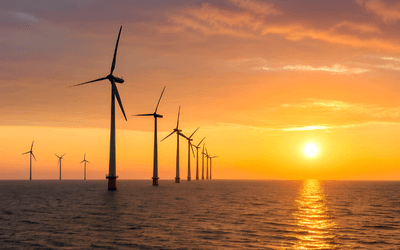2024 was a milestone year for renewables, with a surge in the use of renewable, low-carbon electricity and energy sources marking a significant moment in the global energy transition, according to Ember’s Global Electricity Review 2025.
Based on electricity data from 215 countries around the world, including the latest 2024 insights into the energy use of the 88 countries representing 93% of the global electricity demand, Ember’s review reports that renewables – solar (9%), wind (8%), hydro (14%) and other sources (3%) – and nuclear energy provided 40.9% of the world’s electricity in 2024 – passing the 40% mark for the first time since the 1940s.
Additionally, the report signals that solar energy’s impact continues to grow; in-fact, solar remained the largest source of new electricity globally (+474 TWh) for the third year in a row, with generation doubling over the last three years, and was once again the fastest growing source of electricity.
What’s more, the data suggests that clean energy generation growth is set to outpace faster-rising demand in the coming years, marking the start of a permanent decline in fossil generation. The current expected growth in clean generation would be sufficient to meet a demand increase of 4.1%/y to 2030, which is above expectations for demand growth.
As a result, Ember predicts that the global power system will be dominated by two key ‘mega trends’ in the coming years: solar energy’s share in the electricity mix will rise rapidly as it continues its exponential growth, and robust electricity demand will grow as electricity replaces other forms of energy powering the global economy.
Responding to the report, Phil MacDonald – Managing Director of Ember – said:
"Solar power has become the engine of the global energy transition. Paired with battery storage, solar is set to be an unstoppable force. As the fastest-growing and largest source of new electricity, it is critical in meeting the world’s ever-increasing demand for electricity.
The world is watching how technologies like AI and EVs will drive electricity demand. It’s clear that booming solar and wind are comfortably set to deliver, and those expecting fossil fuel generation to keep rising will be disappointed. Cleantech, not fossil fuels, is now the driving force of economic development. The era of fossil growth is coming to an end, even in a world of fast-rising demand.”
How the Renewables sector must respond to this increasing demand
The ongoing surge in the demand for renewable electricity generation has far-reaching implications for the sector. It and its organisations must adapt to accommodate this burgeoning demand, driving economic development and technological advancements.
To respond effectively to increased demand, the renewables sector must prioritise expansion and capacity building. This includes scaling up production capabilities, investing in innovative technologies, and ensuring the infrastructure can support higher levels of renewable energy generation. Solar energy, paired with battery storage, is poised to be a critical component in meeting global electricity needs, and as clean energy generation outpaces fossil generation, the renewables sector must lead the charge in the energy transition.
Beyond technological advances and expansions, it is also vital to ensure that the renewable energy sector’s workforce is taken on this exciting journey of growth too. People and their skills remain at the heart of the renewables boom, and as the sector grows and evolves there is a pressing need for skilled workers to support the transition.
Education and training programs are vital to equip the existing workforce with the necessary skills to implement and work alongside new technologies and processes, whilst the soaring demand for renewable energy will necessitate an expansion of the workforce – one that will need to be both sizeable and skilled to meet the challenges of the green energy transition.
How Carbon60 contributes to a renewable, low-carbon energy future
At Carbon60, we believe in the developing, engaging, and empowering the next generation of talent, to help shape a better, brighter future for STEM sectors – including energy and renewables.
That’s why we devise and deliver specialist services and solutions such as Recruit, Train, Deploy, to provide emerging talent with opportunities to learn, grow their skills and gain vital experience that they can use to establish exciting prosperous careers whilst helping to narrow skill gaps across industries, futureproof their workforces, and contribute to their growth and success.









